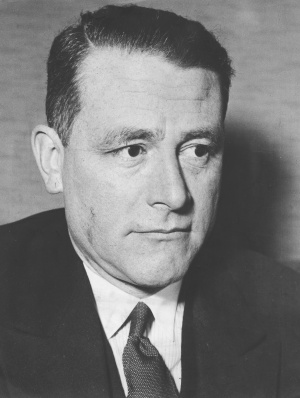Différences entre les versions de « Carl Schmitt »
| Ligne 35 : | Ligne 35 : | ||
"All genuine political theories presuppose man to be evil." | "All genuine political theories presuppose man to be evil." | ||
*[http://en.wikipedia.org/wiki/Carl_Schmitt Carl Schmitt], ''Political Theology: Four Chapters on the Concept of Sovereignty'' (1922), George Schwab, trans. Cambridge, Mass.: MIT Press, 1985 | *[http://en.wikipedia.org/wiki/Carl_Schmitt Carl Schmitt], ''Political Theology: Four Chapters on the Concept of Sovereignty'' (1922), George Schwab, trans. Cambridge, Mass.: MIT Press, 1985 | ||
| + | |||
| + | {{Center|Ernst Jünger and Carl Schmitt in park of Rambouillet, near Paris, October 1941|[[Carl Schmitt]] and [[Ernst Jünger]] in park of Rambouillet, near Paris, October 1941}} | ||
== Internal links == | == Internal links == | ||
Version du 18 février 2014 à 11:49
Politics
« Si tu n’oses pas désigner ton ennemi, lui te désignera. »
« Malheur à celui qui n'a pas d'ennemi, car je serai ton ennemi le jour du Jugement. »
« La distinction spécifique du politique, à laquelle peuvent se ramener les actes et les mobiles politiques, c'est la discrimination de l'ami et de l'ennemi. Elle fournit un principe d'identification qui a valeur de critère, et non une définition exhaustive ou compréhensive. »
- Carl Schmitt, La Notion de politique et Théorie du partisan, éd. Flammarion, 2006, partie II, p. 64
"Sovereign is he who decides on the exception."
- Carl Schmitt, Political Theology: Four Chapters on the Concept of Sovereignty (1922), George Schwab, trans. Cambridge, Mass.: MIT Press, 1985
"All significant concepts of the modern theory of the state are secularized theological concepts not only because of their historical development—in which they were transferred from theology to the theory of the state, whereby, for example, the omnipotent God became the omnipotent lawgiver—but also because of their systematic structure, the recognition of which is necessary for a sociological consideration of these concepts. The exception in jurisprudence is analogous to the miracle in theology."
- Carl Schmitt, Political Theology: Four Chapters on the Concept of Sovereignty (1922), George Schwab, trans. Cambridge, Mass.: MIT Press, 1985
"All law is "situational law." The sovereign produces and guarantees the situation in its totality. He has the monopoly over this last decision."
- Carl Schmitt, Political Theology: Four Chapters on the Concept of Sovereignty (1922), George Schwab, trans. Cambridge, Mass.: MIT Press, 1985
"To be sure, Protestant theology presents a different, supposedly unpolitical doctrine, conceiving of God as the "wholly other," just as in political liberalism the state and politics are conceived of as the "wholly other." We have come to recognize that the political is the total, and as a result we know that any decision about whether something is unpolitical is always a political decision, irrespective of who decides and what reasons are advanced. This also holds for the question whether a particular theology is a political or an unpolitical theology."
- Carl Schmitt, Political Theology: Four Chapters on the Concept of Sovereignty (1922), George Schwab, trans. Cambridge, Mass.: MIT Press, 1985
"The metaphysical image that a definite epoch forges of the world has the same structure as what the world immediately understands to be appropriate as a form of its political organization."
- Carl Schmitt, Political Theology: Four Chapters on the Concept of Sovereignty (1922), George Schwab, trans. Cambridge, Mass.: MIT Press, 1985
"Liberalism, with its contradictions and compromises, existed for Donoso Cortés only in that short interim period in which it was possible to answer the question “Christ or Barabbas?” with a proposal to adjourn or appoint a commission of investigation."
- Carl Schmitt, Political Theology: Four Chapters on the Concept of Sovereignty (1922), George Schwab, trans. Cambridge, Mass.: MIT Press, 1985
"The essence of liberalism is negotiation, a cautious half measure, in the hope that the definitive dispute, the decisive bloody battle, can be transformed into a parliamentary debate and permit the decision to be suspended forever in an everlasting discussion."
- Carl Schmitt, Political Theology: Four Chapters on the Concept of Sovereignty (1922), George Schwab, trans. Cambridge, Mass.: MIT Press, 1985
"All genuine political theories presuppose man to be evil."
- Carl Schmitt, Political Theology: Four Chapters on the Concept of Sovereignty (1922), George Schwab, trans. Cambridge, Mass.: MIT Press, 1985
